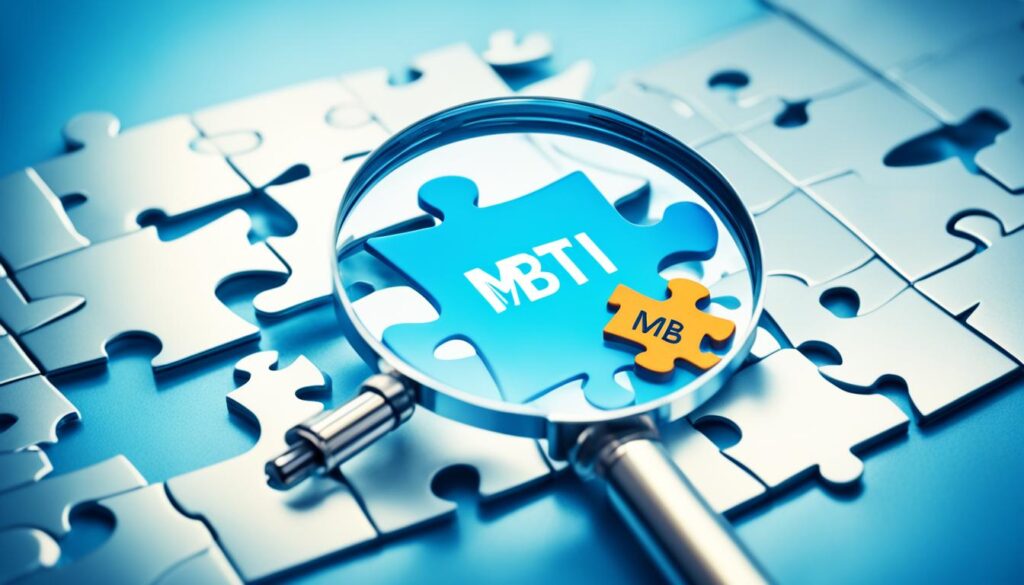Are you aware that the Myers-Briggs Type Indicator (MBTI) is among the most commonly used personality assessments globally? [Translated into English (United States) language] Did you know that the Myers-Briggs Type Indicator (MBTI) is one of the most widely used personality type tests in the world?
Developed by Katharine Cook Briggs and Isabel Briggs Myers, the MBTI provides valuable insights into human psychology and can play a crucial role in understanding ourselves and others. By categorizing individuals into 16 unique personality types based on four fundamental dichotomies, the MBTI offers profound insights into how we interact, communicate, and make decisions.
Are you curious about the meaning and significance of the MBTI personality type test? Join us as we explore the power of the MBTI and how it can enhance personal growth, leadership strategies, career choices, and more.
Key Takeaways:
- The Myers-Briggs Type Indicator (MBTI) is a widely used personality type test.
- It categorizes individuals into 16 unique personality types.
- The MBTI provides insights into communication styles, decision-making processes, and behavior.
- Understanding your personality type can lead to personal growth, improved relationships, and better career choices.
- The MBTI offers valuable insights for leaders to enhance team dynamics and productivity.
The Background of the MBTI
The Myers-Briggs Type Indicator (MBTI) is a widely used psychological tool that helps individuals understand themselves and their interactions with others. Developed by Katharine Cook Briggs and Isabel Briggs Myers, the MBTI is based on the theories of Carl Jung and aims to make Jung’s ideas accessible to the general public.
The MBTI categorizes individuals into 16 personality types, each with its unique strengths, preferences, and tendencies. By understanding their personality type, individuals can gain insights into their behavior, decision-making processes, and communication styles.
Here’s an overview of the 16 MBTI personality types:
| Personality Type | Description |
|---|---|
| ISTJ | Introverted, Sensing, Thinking, Judging |
| ISFJ | Introverted, Sensing, Feeling, Judging |
| INFJ | Introverted, Intuitive, Feeling, Judging |
| INTJ | Introverted, Intuitive, Thinking, Judging |
| ISTP | Introverted, Sensing, Thinking, Perceiving |
| ISFP | Introverted, Sensing, Feeling, Perceiving |
| INFP | Introverted, Intuitive, Feeling, Perceiving |
| INTP | Introverted, Intuitive, Thinking, Perceiving |
| ESTP | Extraverted, Sensing, Thinking, Perceiving |
| ESFP | Extraverted, Sensing, Feeling, Perceiving |
| ENFP | Extraverted, Intuitive, Feeling, Perceiving |
| ENTP | Extraverted, Intuitive, Thinking, Perceiving |
| ESTJ | Extraverted, Sensing, Thinking, Judging |
| ESFJ | Extraverted, Sensing, Feeling, Judging |
| ENFJ | Extraverted, Intuitive, Feeling, Judging |
| ENTJ | Extraverted, Intuitive, Thinking, Judging |
Image:
The Power of the MBTI for Leaders
As leaders, understanding the power of the MBTI can significantly enhance our leadership strategies and drive organizational success. The MBTI provides us with invaluable insights into how our team members perceive the world, make decisions, and interact with others. By recognizing and appreciating the unique strengths of each team member, we can foster a culture of collaboration, innovation, and productivity.
One of the key advantages of the MBTI for leaders is its ability to enhance team synergy. By understanding the diverse approaches and preferences of our team members, we can create a harmonious work environment that leverages their individual strengths. This leads to enhanced collaboration, problem-solving, and overall team performance.
The Importance of Communication
Effective communication is a crucial aspect of leadership, and the MBTI can greatly contribute to improving our communication skills. By understanding the communication styles of our team members, we can adapt our approach to ensure effective and meaningful interactions. This fosters better understanding, trust, and engagement within the team.
Resolving Conflicts
Conflict is inevitable in any workplace, but as leaders, it is our responsibility to address and resolve conflicts effectively. The MBTI can provide us with insights into the different conflict resolution styles of our team members. Armed with this knowledge, we can facilitate constructive discussions, encourage compromise, and promote harmony within the team.
“The MBTI equips us with the understanding and tools needed to create a cohesive team dynamic and foster individual job satisfaction.” – John Maxwell, Leadership Expert
Furthermore, the MBTI enables us to identify potential areas for professional development and growth for ourselves and our team members. By recognizing the unique strengths and preferences of each individual, we can provide targeted training and development opportunities that enhance their skills and contribute to their career advancement.
The Transformational Power of MBTI
The significance of the MBTI test in leadership cannot be overstated. It has the potential to transform our leadership approach and drive successful outcomes for our teams and organizations. By harnessing the power of the MBTI, we can cultivate a positive work environment, improve communication, resolve conflicts, optimize individual and team performance, and ultimately achieve our strategic objectives.
With an understanding of the importance of the MBTI test in leadership, we can confidently adapt our strategies, empower our team members, and lead with precision and purpose.

| Benefits of MBTI for Leaders | Why It Matters |
|---|---|
| Enhanced team synergy and collaboration | Creates a harmonious work environment and increases overall team performance |
| Improved communication and understanding | Fosters better relationships, trust, and engagement within the team |
| Effective conflict resolution | Reduces tension, promotes compromise, and encourages a positive team dynamic |
| Identification of professional development opportunities | Enables targeted training and skill-building for individual and team growth |
How to Use the MBTI for Personal Growth
The MBTI goes beyond simply categorizing individuals into personality types. It offers a wealth of insights into our strengths, weaknesses, and preferences, providing a solid foundation for personal growth and development. By interpreting and understanding our personality type test results, we can embark on a journey of self-improvement, professional development, and better relationships with ourselves and others.
Interpreting our personality type test results requires a deeper understanding of the four dichotomies that make up the MBTI: Extraversion vs. Introversion, Sensing vs. Intuition, Thinking vs. Feeling, and Judging vs. Perceiving. Each aspect offers unique perspectives on our preferences and tendencies, offering valuable guidance for decision-making and goal setting.
With this knowledge, we can align our actions and aspirations with our personality type, maximizing our potential and achieving greater fulfillment in all aspects of life. Whether it’s choosing a career path, enhancing communication skills, or nurturing personal relationships, the MBTI serves as a compass to guide our journey towards personal growth and self-awareness.
Understanding our personality type is like having a roadmap to our inner selves. It allows us to navigate life’s complexities with greater clarity and purpose.
Here are a few practical ways to use the MBTI for personal growth:
- Identify and leverage your strengths: By recognizing your natural strengths and abilities, you can tailor your path towards activities and roles that allow you to shine. Whether you thrive in analytical tasks as a Thinker or excel at connecting with others as a Feeler, understanding your strengths can help you make strategic decisions for personal and professional growth.
- Address weaknesses and challenges: The MBTI also sheds light on areas where you may face challenges or weaknesses. Acknowledging these aspects of your personality can help you identify areas for improvement and take steps towards personal development. For example, an Introvert may work on strengthening their communication skills, while a Perceiver may focus on time management.
- Enhance self-awareness: Understanding your personality type provides deep insights into your thought processes, emotional tendencies, and overall behavior. This knowledge allows you to step back and observe your actions and reactions, fostering self-awareness and enabling you to make conscious choices aligned with your values and goals.
- Improve communication and relationships: The MBTI can significantly enhance your communication skills and relationships with others. By recognizing different personality types and their preferences, you can adapt your communication style to foster effective and meaningful connections. Understanding the primary ways others perceive and process information can also help prevent conflicts and misunderstandings.
Remember, personal growth is an ongoing process, and the MBTI serves as a valuable tool along the way. Embrace the insights provided by the test, use them as building blocks for self-improvement, and celebrate the unique qualities that make you who you are.

| Personality Type | Strengths | Weaknesses |
|---|---|---|
| ISTJ | Reliable, focused, responsible | May be inflexible, overly critical |
| ENFP | Enthusiastic, creative, empathetic | Can be impulsive, overly emotional |
| INTP | Intellectual, analytical, independent | Tendency to overanalyze, difficulty with emotions |
| ESFJ | Warm, caring, dependable | May be overly dependent on others’ opinions |
| ENTJ | Assertive, strategic, decisive | May be perceived as domineering or controlling |
The Importance of Understanding MBTI Test Results
Understanding the results of the MBTI test is essential to fully benefit from its insights. Each letter in the MBTI code represents a different aspect of your personality, revealing valuable information about your communication style, decision-making process, and overall behavior.
Decoding the MBTI Code
The MBTI utilizes four dichotomies to categorize individuals into one of 16 personality types:
- Extraversion (E) vs. Introversion (I): Determines how you gain energy and engage with the world around you.
- Sensing (S) vs. Intuition (N): Reflects how you perceive information and process it.
- Thinking (T) vs. Feeling (F): Represents how you make decisions and prioritize value.
- Judging (J) vs. Perceiving (P): Defines your approach to organizing your life and handling tasks.
By understanding the implications of these preferences, you can gain valuable insights into your own strengths and challenges. This self-awareness can help you adapt your communication style, navigate decision-making more effectively, and foster healthy relationships with others.
“The MBTI test results provide a roadmap to self-discovery; they uncover your unique preferences and guide you toward personal growth and better understanding.”
Whether you’re an extravert who thrives in group settings or an introvert who enjoys solitude for reflection, your MBTI test results shed light on your natural inclinations and behaviors. They serve as a foundation for personal and interpersonal development.
The Impact on Communication and Relationships
Understanding your personality type can significantly improve your communication skills. It enables you to recognize and appreciate the different perspectives and preferences of others, leading to more effective collaboration and teamwork.
“When we understand our own personality type, we can adapt our communication style to connect more effectively with others, fostering understanding and building stronger relationships.”
The insights gained from understanding MBTI test results empower you to tailor your approach to fit the needs of different individuals, resulting in more productive and harmonious interactions in both personal and professional settings.
Enhancing Decision-Making and Self-Development
By delving into your MBTI test results, you gain clarity on your natural inclinations, which can guide your decision-making process. Understanding your personality type helps you align your choices with your values, which leads to greater satisfaction and fulfillment.
“Knowing your personality type allows you to make decisions that are in line with your authentic self, leading to a more purposeful and meaningful life.”
Additionally, recognizing your strengths and growth areas through the MBTI test results empowers you to focus on personal development. It provides a roadmap for self-improvement and allows you to set realistic goals that leverage your natural talents.

Understanding your MBTI test results is instrumental in unlocking your full potential. It enables you to harness the power of self-awareness, adapt your communication style, foster meaningful relationships, and make informed decisions aligned with your authentic self.
How the MBTI Can Guide Career Choices
The MBTI can be a helpful tool in career guidance. By understanding your personality type, you can gain insights into which careers and job roles align with your strengths and preferences. This knowledge can guide career choices and lead to greater job satisfaction and success. Each personality type is suited to different fields and professions, and knowing your type can help narrow down options and make more informed decisions.
Exploring Career Options Based on Personality Types
Below is a table that outlines some potential career paths associated with each MBTI personality type:
| Personality Type | Potential Career Paths |
|---|---|
| ISTJ | Accountant, Engineer, Project Manager |
| ISFJ | Teacher, Nurse, Social Worker |
| INFJ | Psychologist, Humanitarian, Writer |
| INTJ | Scientist, Architect, CEO |
| ISTP | Mechanic, Pilot, Forensic Investigator |
| ISFP | Artist, Counselor, Yoga Instructor |
| INFP | Writer, Counselor, Graphic Designer |
| INTP | Researcher, Software Developer, Professor |
| ESTP | Salesperson, Entrepreneur, Police Officer |
| ESFP | Actor, Event Planner, Personal Trainer |
These are just a few examples, and it is important to remember that individual interests, skills, and experiences also play a significant role in career choices. The MBTI can serve as a starting point for exploring potential career paths that may align well with your personality type.

Using MBTI for Teenagers’ Self-Discovery
As teenagers navigate their journey of self-discovery, the MBTI can be an invaluable tool to help them understand themselves better and make sense of their unique characteristics. By taking an official MBTI test, teenagers can gain insights into their strengths, weaknesses, and preferences, providing them with a deeper understanding of who they are.
This knowledge gained from the MBTI test can have a profound impact on their lives. It can contribute to improved relationships with peers and family members, as they become aware of their own communication styles and learn to appreciate the differences in others. Furthermore, it can enhance their decision-making abilities, empowering them to make choices aligned with their values and motivations.
Self-discovery, facilitated by the MBTI, allows teenagers to gain greater clarity about their ambitions, dreams, and aspirations. They develop a stronger sense of self, allowing them to face challenges with confidence and resilience. Armed with a better understanding of themselves, teenagers can navigate the complexities of their teenage years with a greater sense of purpose and self-assurance.
Discovering and embracing one’s unique personality type can be a transformative journey for teenagers, fueling personal growth and positively shaping their future endeavors. The MBTI serves as a guide, empowering teenagers to embrace their individuality and make choices that align with their authentic selves. With this deep understanding, teenagers are well-equipped to embark on their path to success and fulfillment.
Benefits of MBTI for Teenagers:
- Improved relationships with peers and family members
- Enhanced decision-making abilities
- Greater clarity on values and motivations
- Boosted confidence and resilience
- Facilitated personal growth and self-discovery
“The MBTI provides teenagers with valuable insights into their unique characteristics, empowering them to navigate their teenage years with confidence and a stronger sense of self.”

With the MBTI, teenagers can embrace their true selves, harness their strengths, and overcome challenges on their journey to self-discovery. By understanding themselves better, they can thrive academically, personally, and socially, setting the stage for a bright and successful future.
Assessing the Accuracy of MBTI Results
When it comes to assessing the accuracy of MBTI results, numerous studies have shown that the MBTI is a reliable tool. The results of the MBTI tend to align well with individuals’ self-perceptions and observable behaviors, providing valuable insights into their personality traits and preferences.
However, it is important to note that the MBTI should not be regarded as a definitive measure of personality. Instead, it should be viewed as a tool for self-exploration and understanding. The MBTI classifies individuals into one of 16 personality types based on their preferences, but it is essential to remember that personality is complex and multifaceted, and cannot be fully captured by a single test.
To fully interpret and understand MBTI results, it is advisable to seek the expertise and guidance of a certified MBTI practitioner. These professionals have the knowledge and experience to provide unbiased insights and help individuals make sense of their MBTI results in a meaningful way. They can help clarify any doubts, address misconceptions, and offer personalized recommendations for personal growth, career development, and relationship improvement.
Remember, the accuracy of the MBTI lies in its ability to prompt self-reflection and stimulate deeper understanding. It should be approached as a tool that opens the door to valuable insights, rather than a rigid categorization system.
By engaging with a certified MBTI practitioner, individuals can navigate the complexities of their personality type with professional guidance, ensuring a nuanced interpretation of their results. This can lead to a more informed and accurate understanding of oneself and others, allowing for meaningful personal growth and enhanced self-awareness.
Expert Quote:
“The MBTI provides valuable insights into personality types, but it is important to remember its limitations. The accuracy of MBTI results lies in their ability to facilitate self-discovery and understanding, not in rigid categorization.” – Dr. Sarah Johnson, Certified MBTI Practitioner

In conclusion, while the MBTI offers a useful framework for understanding personality types, its accuracy should be viewed in the context of self-exploration and personal growth. By seeking guidance from certified professionals, individuals can gain a deeper understanding of their MBTI results and use them as a catalyst for personal development and improved relationships.
How to Choose a Reliable MBTI Test Provider
When it comes to selecting an MBTI test provider, it’s crucial to choose one that is reliable and reputable. With numerous options available, finding the right provider can ensure accurate results and valuable insights into your personality type. Here are some factors to consider when making your choice:
- Reliability and Reputation: Look for a provider with a proven track record of administering reliable MBTI tests. Opt for well-established organizations or institutions known for their expertise in the field.
- Tailored Assessments: Ensure that the MBTI test offered by the provider is tailored to your age group. This ensures that the questions and interpretations are relevant to your stage of life.
- Easy-to-Understand Results: The provider should offer clear and easy-to-understand interpretations of your MBTI test results. This will help you gain insights into your personality type without confusion or ambiguity.
- Experience with Teenagers: If you’re a teenager taking the MBTI test, consider providers who have experience working with this age group. They will better understand the unique needs and challenges faced by adolescents.
- Certified Practitioners: Opt for a provider that employs expert and certified MBTI practitioners. These professionals have the knowledge and experience to guide you through the test results and provide personalized advice based on your personality type.
Choosing a reliable and reputable MBTI test provider ensures that you receive accurate results and meaningful insights into your personality type. It sets the foundation for personal growth, improved communication, and enhanced self-awareness.
Image:

The Benefits of Understanding Your Personality Type
Understanding your personality type through the MBTI assessment can have numerous benefits. It helps you understand your strengths, weaknesses, and preferences, allowing you to make more informed decisions, both personally and professionally. The insights gained from the MBTI can improve relationships, facilitate personal growth, enhance communication, and provide guidance for goal setting and career choices. Knowing yourself better can ultimately lead to greater satisfaction and success in various aspects of life.
| Benefits of MBTI Test | Personal Growth | Decision-Making |
|---|---|---|
| 1. Improved self-awareness | 1. Identifying areas for improvement | 1. Making informed choices |
| 2. Enhanced interpersonal relationships | 2. Embracing personal strengths | 2. Evaluating different options |
| 3. Effective communication skills | 3. Setting personal development goals | 3. Weighing pros and cons |
| 4. Conflict resolution strategies | 4. Overcoming personal obstacles | 4. Considering long-term implications |
| 5. Career alignment and fulfillment | 5. Expanding self-awareness | 5. Aligning decisions with values |
By understanding your personality type, you gain valuable insights into who you are and how you interact with the world. This self-knowledge empowers you to make choices that align with your authentic self, leading to personal growth, fulfillment, and a clearer sense of purpose. Whether it’s improving relationships, excelling in your career, or making important life decisions, the benefits of the MBTI extend far beyond a simple personality test.

With the knowledge and understanding of your personality type, you can embark on a journey of self-discovery and personal transformation. Embrace the power of the MBTI and unlock your true potential.
Conclusion
The MBTI is a powerful tool that unlocks valuable insights into personality types and helps us understand ourselves and others better. Whether you’re a leader looking to optimize team dynamics, an individual seeking personal growth, or a teenager navigating the path of self-discovery, the MBTI can provide invaluable guidance.
By leveraging the insights gained from the MBTI, we can enhance our communication skills, improve our decision-making processes, and foster personal growth. Understanding the meaning and significance of the MBTI personality type test allows us to navigate our personal and professional journeys with greater clarity and purpose.
With a deeper understanding of our unique strengths, weaknesses, and preferences, we can make more informed decisions, build stronger relationships, and set meaningful goals. The MBTI empowers us to live a more fulfilling life by embracing our authentic selves and embracing the unique qualities and perspectives of those around us.
How can MBTI Personality Type Test help in self-reflection and personal insight?
The MBTI Personality Type Test can be a valuable tool for self-reflection and personal insight. By taking the personality test reflection paper insights, individuals can gain a better understanding of their strengths, weaknesses, and natural tendencies. This can lead to greater self-awareness and clarity in making important life decisions.
FAQ
What is the Myers-Briggs Type Indicator (MBTI) and what does it measure?
The MBTI is a powerful tool that categorizes individuals into one of 16 personality types based on four dichotomies: Extraversion vs. Introversion, Sensing vs. Intuition, Thinking vs. Feeling, and Judging vs. Perceiving. It provides insights into human psychology and can be used to understand team dynamics and maximize productivity.
What is the background of the MBTI?
The MBTI was developed by Katharine Cook Briggs and Isabel Briggs Myers, based on Carl Jung’s theories of psychological types. Their aim was to make Jung’s theories applicable to the everyday person. The MBTI is one of the most widely used psychological tools globally, helping individuals better understand themselves and their interactions with others.
How can the MBTI help leaders?
The MBTI helps leaders understand how different team members perceive the world, make decisions, and interact with others. By appreciating their team’s unique strengths and understanding their different approaches, leaders can enhance team synergy, effective communication, conflict resolution, and overall team dynamics.
How can the MBTI be used for personal growth?
The MBTI provides individuals with insights into their own strengths, weaknesses, and preferences, allowing them to make informed decisions and set goals aligned with their personality type. It can lead to self-improvement, professional development, and a better understanding of oneself and others.
Why is it important to understand MBTI test results?
Each letter in the MBTI code represents a different aspect of an individual’s personality. Understanding the implications of these preferences can provide valuable insights into communication styles, decision-making processes, and overall behavior.
How can the MBTI guide career choices?
By understanding their personality type, individuals can gain insights into which careers and job roles align with their strengths and preferences. This knowledge can guide career choices and lead to greater job satisfaction and success.
How can the MBTI benefit teenagers?
Taking an official MBTI test can help teenagers gain insight into their unique characteristics, strengths, and weaknesses. This knowledge can lead to improved relationships, better decision-making, greater clarity on values and motivations, enhanced confidence, and improved self-understanding.
How accurate are MBTI test results?
Numerous studies have shown that MBTI results have a high level of accuracy, aligning with individuals’ self-perceptions and behaviors. However, it should be used as a tool for self-exploration and understanding rather than a strict categorization system.
How can I choose a reliable MBTI test provider?
When selecting an MBTI test provider, ensure they offer age-appropriate assessments and easy-to-understand interpretations of results. Look for providers with experience working with teenagers if that is your target audience. Opting for a certified MBTI practitioner can ensure unbiased guidance.
What are the benefits of understanding your personality type through the MBTI?
Understanding your personality type through the MBTI assessment can help you make informed decisions, improve relationships, facilitate personal growth, enhance communication, and provide guidance for goal setting and career choices.
What is the significance of the MBTI personality type test?
The MBTI is a powerful tool for unlocking insights into personality types and understanding oneself and others. It can provide valuable guidance for leaders, individuals, and teenagers navigating their personal and professional journeys.
Eugene brings a fresh, dynamic voice to our platform as one of our talented Writers. Specializing in research-driven content, he explores the latest findings in psychology and personal growth, translating them into actionable insights for our readers. Eugene’s work is fueled by a curiosity about what makes us tick and a desire to help others unlock their potential.










